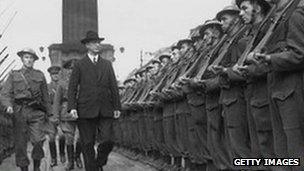Assembly motion supports pardon for Ireland's WWII deserters
- Published

The then Taoiseach, Eamon de Valera, inspects his country's neutral army
The NI assembly is to consider a motion later to support a pardon for soldiers from the Irish Republic who deserted to fight for Britain during World War II.
Ireland was neutral during the conflict, but around 10% of its armed forces deserted to fight fascism.
On their return, many were placed on an official blacklist, banning them from jobs, benefits or pensions.
DUP MLA Peter Weir is supporting the motion and said it was time for a pardon.
"I want to show the solidarity of the Northern Ireland Assembly to a very good campaign which has been put forward by people in the Irish Republic to try and get a pardon and indeed honour and recognition for those brave men and women who served the Irish Republic in the Second World War against facism," he said.
"I don't see why the parties should not roll in behind this, this was very much an abuse of human rights.
"These were people who were denied employment and welfare which in many cases were enforced with starvation orders where families went hungry as a result of their commitment to the British army.
"I think this is an historic injustice which needs to be embraced."
Around 5,000 soldiers were formally dismissed from the Irish army for serving with the British.
Irish senator Mary Ann O'Brien met with Ireland's minister of justice, Alan Shatter, before Christmas with regard to the issue of a pardon and said he was actively working on the matter.
She expects to hear from him again in March and voiced her support for the assembly motion.
"We are lucky we are not Germany here, because we have to remember that these men deserted the Irish army to join the British army to fight for all of us, for our democracy and our future and for the freedom of Europe," she added.
"They came back here to find no hope of employment, there was terrible poverty but they were literally blacklisted.
"I can tell you something worse if they were unlucky enough to have been killed, their children would possibly have ended up in an orphanage as the poverty would have been such the widow would not have been allowed any allowance as she too was blacklisted.
"The child was tarnished with special letters after his or her name when it went into the orphanage so the orphanage would know it was the child of a deserter, so it would get special treatment."
- Published28 December 2011
- Published28 December 2011